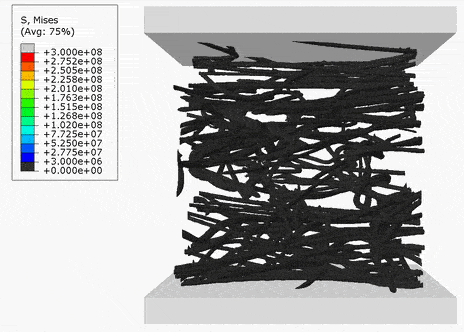Simulation-Based Engineering Consortium Partners with Indiana Industry
The Indiana Consortium for Simulation-Based Engineering of Materials and Structures (ICSEMS) formed in January 2017. "It's designed to be a mutually beneficial partnership," said Thomas Siegmund, professor of Mechanical Engineering. "Manufacturers can benefit from our expertise in computational modeling, and Purdue students and faculty can benefit from conducting that research in real-world environments."
Simulation-Based Engineering refers to the computer modeling of materials, specifically in stress and deformation analysis, fatigue and fracture, shape optimization, and material selection. "Our computer simulations can predict where structures might break down, or need additional strengthening," said Siegmund. "That knowledge is crucial to manufacturers, who can get their products to market more quickly, efficiently, and safely."
 In a real-life case study, Purdue faculty have been working with Knauf Insulation in Shelbyville, Ind., a manufacturer of glass fiber insulation materials. During the introduction of a new insulation material into the marketplace, Knauf engineers worked with Purdue faculty to better understand and to fine-tune the material microstructure. Purdue researchers were able to simulate the material microstructure and its deformation and failure response in the computer, and determined how forces are distributed internally to the material. Based on the collaboration with Purdue faculty, Knauf Insulation implemented several new techniques into their R&D processes.
In a real-life case study, Purdue faculty have been working with Knauf Insulation in Shelbyville, Ind., a manufacturer of glass fiber insulation materials. During the introduction of a new insulation material into the marketplace, Knauf engineers worked with Purdue faculty to better understand and to fine-tune the material microstructure. Purdue researchers were able to simulate the material microstructure and its deformation and failure response in the computer, and determined how forces are distributed internally to the material. Based on the collaboration with Purdue faculty, Knauf Insulation implemented several new techniques into their R&D processes.
Consortium members come from the Purdue's School of Mechanical Engineering, the School of Aeronautics and Astronautics, and the Lyles School of Civil Engineering. Their technical expertise and computational infrastructure can be useful in many industries, including automotive, aerospace, civil infrastructure, biomedical, materials, defense, and consumer products. Additionally, the consortium focuses on providing education and training for the engineering workforce and providing a platform for running open source simulation software for small and medium enterprises.
"We're looking forward to what Indiana manufacturers can accomplish when they team up with our simulation-based engineers," said Siegmund.
For more information about ICSEMS, visit http://purdue.edu/icsems
ICSEMS is a part of the Indiana Next Generation Manufacturing Competitiveness Center (IN-MaC), which aims to sustain manufacturing growth and leadership in the state of Indiana. More information about IN-MaC is available at http://purdue.edu/in-mac.
Writer: Jared Pike, 765-496-0374, jaredpike@purdue.edu
Source: Thomas Siegmund, 765-494-9766, siegmund@purdue.edu
Michael Sangid, 765-494-0146, msangid@purdue.edu
Arun Prakash, 765-494-6696, aprakas@purdue.edu

